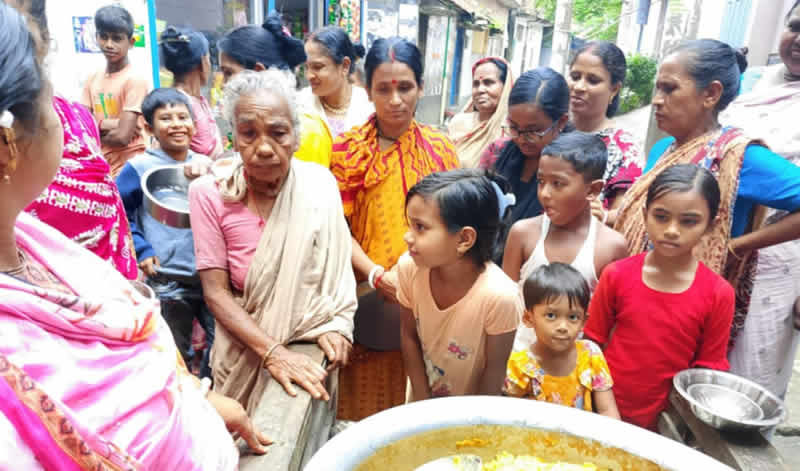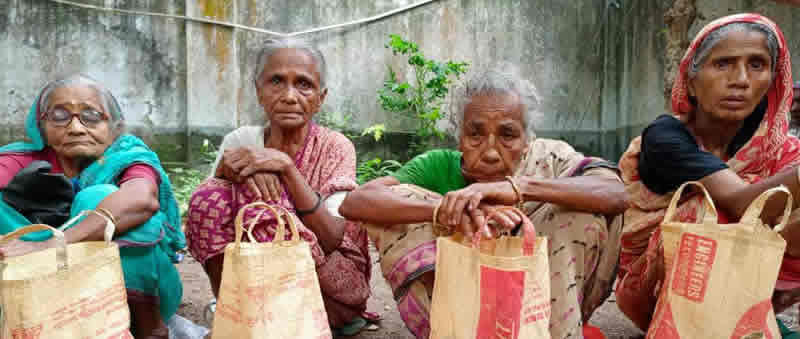Rice Food Aid: Lifeline for Bangladesh’s Vulnerable Amid Crises
- David Burgess
- Jul 25, 2025
- 5 min read
Introduction To Rice Food Aid: A Lifeline for Bangladesh

Bangladesh, a densely populated South Asian country, faces numerous challenges related to food security, poverty, and natural disasters. Over the years, rice has remained the staple food for the vast majority of Bangladeshis, making it central to nutrition and daily sustenance. However, due to frequent floods, cyclones, economic hardships, and the persistent impacts of climate change, many vulnerable populations struggle to access adequate food supplies. In such scenarios, food aid initiatives specifically targeting rice distribution become critical to alleviating hunger and ensuring community resilience.
Among the organizations playing a crucial role in addressing these challenges is Lotus Ministry Trust, which has been dedicated to providing rice food aid, a lifeline for Bangladesh. Their focused efforts have enabled thousands of families to overcome food insecurity during difficult times, contributing significantly to Bangladesh's ongoing battle against hunger.
The Importance of Rice as a Dietary Staple in Bangladesh
Rice is more than just a crop in Bangladesh; it is intertwined with the cultural, economic, and social fabric of the country. Over 75% of the average diet of Bangladeshis revolves around rice consumption. The country's agricultural landscape revolves heavily around rice cultivation, and it is deeply embedded in traditional practices and daily meals.
The significance of rice in Bangladesh cannot be overstated:
- Nutritional Value: Rice provides the necessary carbohydrates for energy. It is often complemented with lentils and vegetables, but when rice supply is disrupted, nutritional deficiencies risk escalating.
- Economic Backbone: A significant portion of the rural population depends on rice cultivation for their livelihood.
- Cultural Significance: Festivals, religious ceremonies, and family rituals often revolve around rice-based foods.
In light of the urgent need for support, many organizations and individuals are stepping up to provide assistance to those affected in Bangladesh. If you want to contribute directly and make a tangible difference in people’s lives by providing essential food supplies and relief, consider supporting ongoing initiatives. You can help deliver critical aid to families struggling to secure their next meal, ensuring no one goes hungry during these challenging times.
Despite this central role in everyday life, rice production often faces threats from environmental factors, market fluctuations, and natural disasters, making rice food aid efforts highly essential.
Challenges Leading to the Need for Rice Food Aid in Bangladesh
Bangladesh experiences recurring natural disasters such as flooding, cyclones, and riverbank erosion. These calamities damage crops, displace populations, and create immediate needs for food assistance. Some of the key challenges that necessitate rice aid in Bangladesh include:
- Climate-Induced Disruptions: Erratic monsoons and increased frequency of disastrous weather events have affected agricultural cycles adversely.
- Poverty and Economic Instability: Despite progress in poverty reduction, millions still live below the poverty line and face challenges in purchasing sufficient food.
- Population Pressure: High population density intensifies demand on food resources.
- Supply Chain Disruptions: Infrastructure limitations can hamper the distribution of food to remote or disaster-affected areas.
In this context, targeted rice food aid programs become indispensable in immediately supporting vulnerable communities, ensuring a buffer during sharp food shortages.

Lotus Ministry Trust: A Beacon of Hope in Rice Aid Distribution
Established as a humanitarian organization committed to uplifting disadvantaged communities, Lotus Ministry Trust has become an instrumental player in the field of rice food aid in Bangladesh. Their approach goes beyond simple food distribution by combining compassion, faith-inspired motivation, and strategic community engagement.
The Trust operates with clear objectives:
- Reliability: Establish consistent and timely rice distribution to areas of greatest need.
- Sustainability: Work with local partners and stakeholders to build longer-term food security solutions.
- Transparency: Maintain open reporting and ensure accountability for aid resources.
By focusing on rice food aid in Bangladesh, Lotus Ministry Trust fills a critical niche during emergencies and chronic food shortages alike.
Implementation Strategies of Lotus Ministry Trust’s Rice Aid Programs
The effectiveness of Lotus Ministry Trust’s rice aid in Bangladesh stems from well-planned and community-centered strategies. Their program design includes:
1. Needs Assessment: Conducting thorough ground-level surveys to identify the most vulnerable groups, including flood victims, impoverished families, elderly individuals, and physically challenged persons.
2. Local Partnerships: Collaborating with local NGOs, village leaders, and government bodies to coordinate distribution and avoid duplication.
3. Logistics Management: Establishing supply chains that leverage local warehouses, transportation networks, and volunteer labor to ensure timely delivery.
4. Community Engagement: Including recipients in the process to foster dignity, acceptance, and accountability.
5. Complementary Services: Sometimes pairing rice distribution with nutritional education or livelihood training to enhance overall community resilience.
These strategic pillars allow Lotus Ministry Trust to maximize the reach and impact of their rice food aid programs.
Impact of Rice Food Aid by Lotus Ministry Trust in Bangladesh
The contribution of Lotus Ministry Trust in mitigating food insecurity through rice aid has been profound in several measurable ways:
- Immediate Relief: Thousands of families receive rice rations during extreme weather seasons, reducing the risk of malnutrition.
- Enhanced Health Outcomes: Stable access to rice contributes to improved dietary intake among children and elderly populations, critical for their development and well-being.
- Community Stability: The availability of rice food aid prevents forced migration and social unrest triggered by food scarcity.
- Increased Awareness: Through their programs, Lotus Ministry Trust promotes a better understanding of food security issues and encourages collaborative problem-solving.
One beneficiary shared, “When the floods destroyed our home and crops, the rice aid from Lotus Ministry Trust was a lifeline for us. It gave us hope to rebuild.” Such testimonies reflect the deep human impact beyond statistics.

Challenges Faced by Lotus Ministry Trust in Delivering Rice Aid
Despite their successes, Lotus Ministry Trust encounters multiple hurdles in delivering rice food aid in Bangladesh:
- Infrastructure Limitations: Poor road access during rainy seasons challenges transportation and timely delivery.
- Resource Constraints: The high demand sometimes exceeds the available donations and funding.
- Political and Bureaucratic Barriers: Navigating local regulations and securing permissions can delay operations.
- Disaster Scale and Frequency: Increasing climate events put additional pressure on the program’s capacity.
Acknowledging these challenges drives continuous program improvement and advocacy by the Trust.
The Future of Rice Food Aid in Bangladesh and Lotus Ministry Trust’s Role
As the need for sustainable food security grows in Bangladesh, organizations like Lotus Ministry Trust are increasingly vital. The future direction involves:
- Scaling Up Aid: Expanding rice distribution networks to more remote and at-risk communities.
- Integrating Technology: Using data tracking and digital mapping to streamline aid delivery.
- Promoting Agricultural Resilience: Supporting local farmers with training, seeds, and resources to increase rice production and reduce aid dependency.
- Mobilizing Global Support: Engaging donors worldwide to secure steady funding and resources.
The evolving role of Lotus Ministry Trust will likely remain at the forefront of rice food aid efforts, combining immediate relief with longer-term development goals.
Conclusion
Rice food aid in Bangladesh addresses one of the most basic human needs—access to nutritious food—and is essential for the survival and well-being of vulnerable populations. Lotus Ministry Trust exemplifies how focused, compassionate, and strategic interventions can significantly improve food security outcomes. Their work ensures that in the face of natural disasters and economic hardships, no family has to endure hunger without hope. As
Bangladesh continues to confront challenges related to climate change, poverty, and population pressure, and the importance of rice aid by dedicated organizations like Lotus Ministry Trust will only grow, marking a vital contribution to national and global humanitarian efforts.















Comments